Study group: peer-to-peer advocacy and absorbing outrage
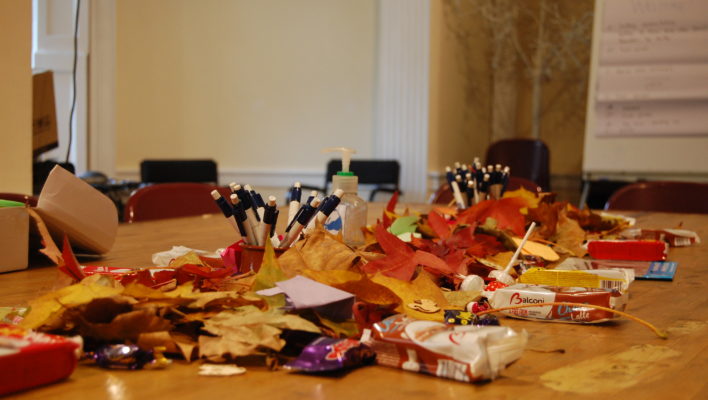
To gather evidence for a United Nations review of the UK’s human rights compliance, ATD Fourth World is running a two-year series of study groups on poverty, social work and the right to family life. Earlier sessions focused on risk and neglect and ATD submitted its first report to the UN in December 2022.
The third session, on 27-28 October 2022, focused on the theme of “Community resilience, strengths-based agency, and parent-to-parent advocacy”. The 16 participants included 7 lived-experience activists; 3 practitioners of social work or family support work; and 3 academics in the fields of social work or human rights. The preparation group chose this theme because of the potential for parent-to-parent advocacy to have a positive impact on social work decisions about children and families in poverty.
One participant is a parent who experienced poverty and social work intervention herself and, ten years later, trained with a local authority to provide parent-to-parent advocacy. She launched the session by explaining how she approaches the parents she aims to support:
“At the beginning, it’s difficult for them because they may see me and think: ‘This is one more person come to give me more trouble and paint a wrong story about me’. They already have so many meetings, so many people on their case. They do need to meet and talk, but it’s so stressful and crazy for them to take on another new person. Most parents are very angry.”
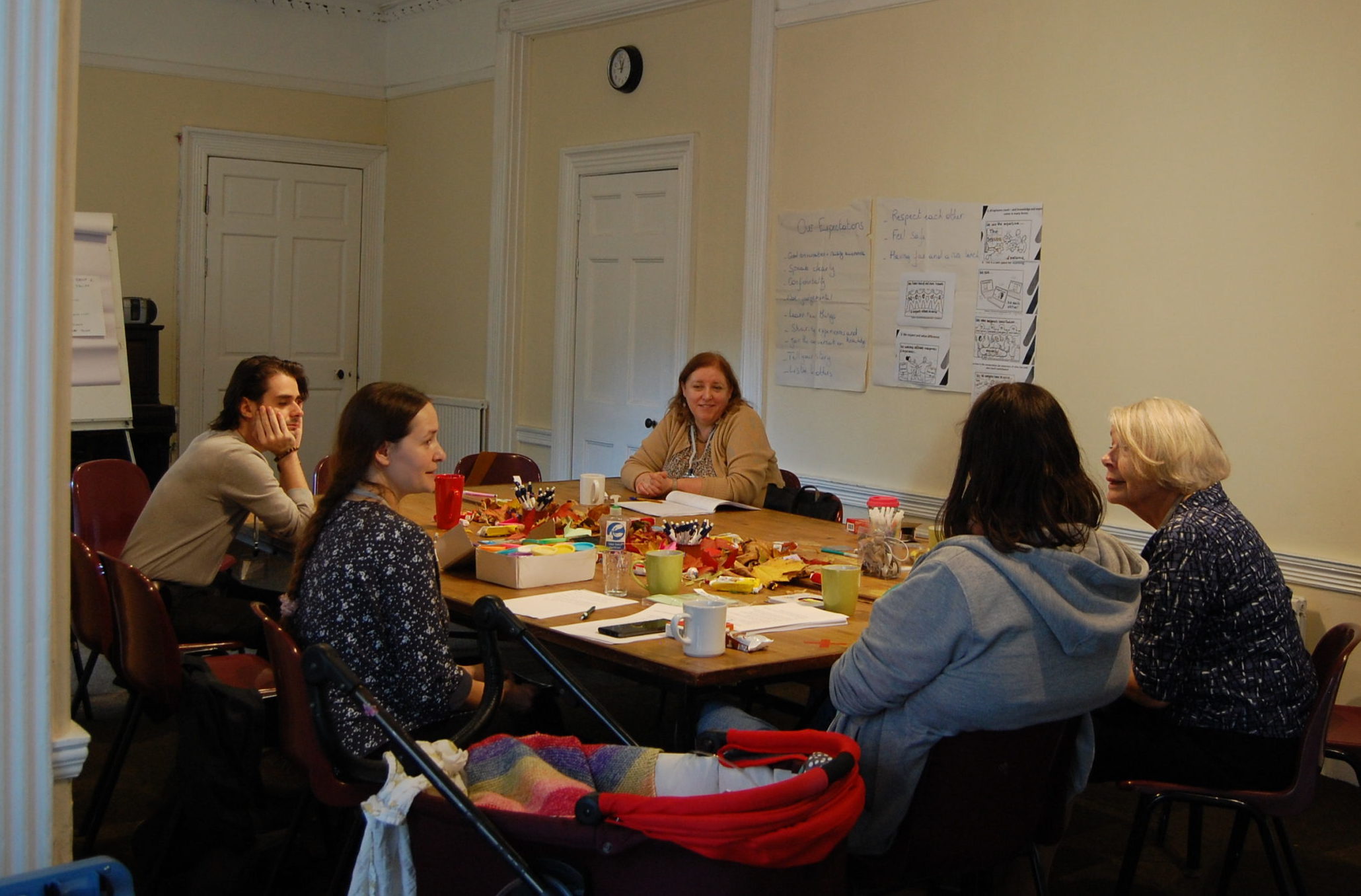
Offering moral support
“I’m not coming to give you trouble. I’ve been through this. Now I help other people with my experience. Don’t think I’m an enemy. I’m not a person who can influence the outcome.
“But I will let you know you have your voice. Don’t be afraid to speak up. I want to help because when you go into these meetings, you feel that everyone attacks you. You’re facing a giant.
“I give support so you feel there’s someone behind you. Our role is to inspire parents to get their power back and stand up for themselves. If I can do it, you can do it too.”
Offering practical support
“I can be a witness for parents so professionals can’t say ‘they didn’t say that’. I make notes on what’s happening in the meetings. That gives parents more reassurance, even though I don’t speak for them. I encourage them to speak for themselves because that is really important. You find your voice. I only speak when they request me to. Before we go into a meeting, I go through the report with them and ask, ‘What’s the first thing you want to get across?’ so that if she misses saying it in the meeting I may remind her. Or maybe the chair will ask me if I have anything to say, and I could add what the mother wanted to say.
“I also tell parents how to better communicate. You won’t get your point across if you shout at people. A parent I work with is a big woman, very loud, talking very fast. Some people may feel like she is aggressive. But she isn’t; it’s just how she speaks. So I told her, ‘Maybe change your way. Be calm. Let people finish and then you will have your chance to let them know what you think so that they will give you the right support. But arguing in a meeting doesn’t mean you’re right. When both sides are hostile, it makes things worse. If you want people to listen, just be calm and respect people or they won’t respect you’. She listened to my advice and I’m so pleased.
“I’ll also explain to social workers: ‘She’s not like this. It’s not what you think’. You have to give people a chance to understand where this is coming from. The parent will tell me things because she trusts me now and wants to hear what I say. It’s more transparent now so the social worker won’t think she’s hiding something. What changes people is starting to build better relationships.”
Lived experience and empathy
“Policy makers are just sitting in Whitehall without knowing what people are suffering. That’s not working. You can’t provide a service for something that you don’t really know in your ideal world. As for social workers, to go into this field they must have passion to help people—but then they get taught this cold-hearted stuff about a harmful system. With parent-to-parent advocacy, that could be changed.
“Parents can contact me anytime. Supposedly I only meet them and talk to them to explain the situation. I don’t need to check in on them. But I do extra because we have this relationship. I need to show them. I care. This is how we build a trust as a parent advocate which I think social workers cannot do. However much effort they put in, in parents eyes they don’t find this sincere from social workers. But when they know you’ve gone through the same things, somehow they find comfort and they trust the person and listen to your advice. Lived experience is super important to this role.
“Somebody with no lived experience, like a lawyer or a barrister, they can do practical things, but they can’t provide the personal touch that helps a person to change their life.”
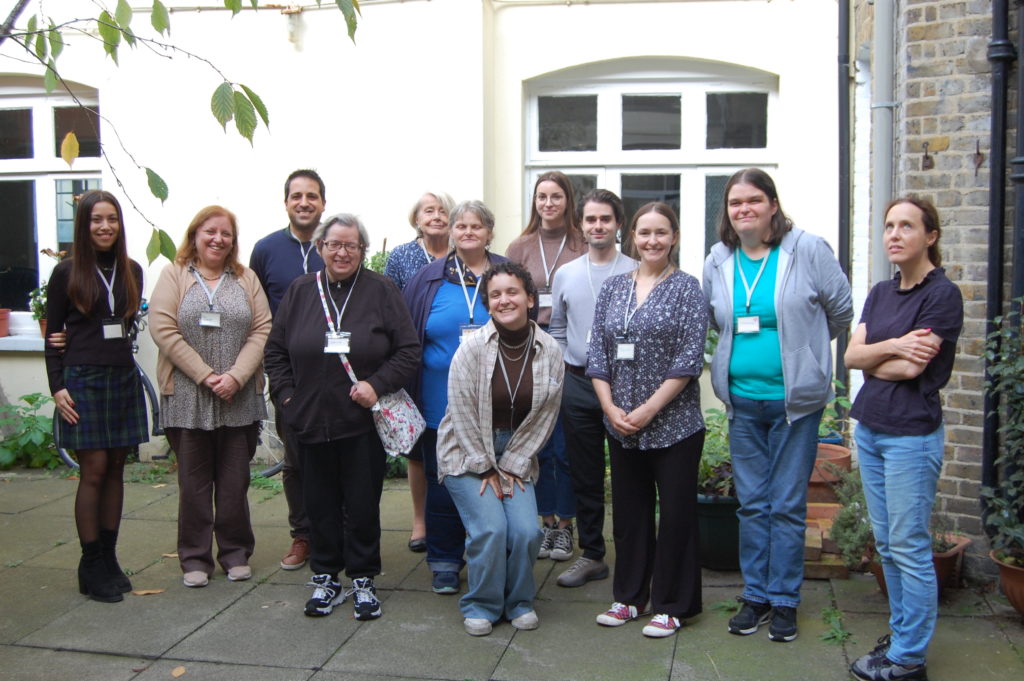
Urging parents to look forward
“A lot of parents wallow in the report from the past. Some parents are upset and say, ‘but that’s years ago’. Unfortunately you can’t erase those things. They stay in the record for 100 years. We are very upset about the past. But just look forward! Don’t look at the front page of the report. Look at the end: what is their concern now? And what do they say about recent changes? That’s more important!
“Yesterday, I met another new parent whose situation is very complicated. Initially we had a chat and we cried together. Then I encouraged her step-by-step not to go back to that same pattern. Now she has more confidence and less anxiety. She’s preparing for a case conference. I told her, ‘Even though we hope for a good outcome, we need to prepare for the outcome that we don’t want too. We need to prepare. I’m not here to tell you that things will happen as you wish, but to prepare you for dealing with the situation’. That’s more important.
“We need to have the strength and wisdom and the strategies to face our problems.
“And we need to love ourselves.”
On resilience
“In my own case, what helped me to build resilience was finding a social worker who supported my strength. She told my friends, ‘We want her to be strong so she will be better in the future’. That’s different from just giving comfort words and saying ‘you will be fine’ without actually doing something. To love is to act. To build a person’s strength, don’t just spoon-feed them. Your work is the person, not the case.
“You’re trying to inspire people with compassion to help them stand up and fly again. I want to let parents know there is hope.
“I got through this. I found my strength for my son. For them as well, this is not the end. They can fight and stand up. If you have hope, it can motivate you to change your situation.”
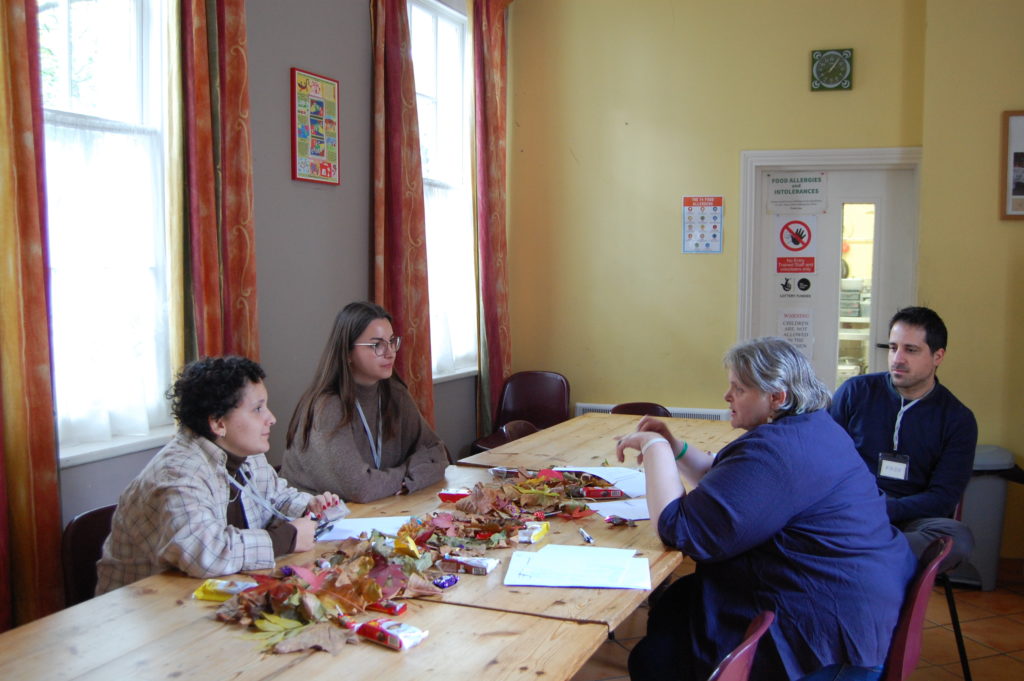
Key discussion points
The discussion that followed this presentation focused on several points:
- People in poverty are under constant mental stress.
- The unhelpful solutions they are given by the system—sometimes offered ‘little sticking plasters even though the injury has gone straight down to the bone’—undermine their efforts and confidence.
- A strengths-based approach empowers people by helping them compartmentalise trauma and reframe their own identity in a positive way.
- Balancing confidentiality and safeguarding concerns is best done with an approach based on human rights.
- The value of peer-to-peer support offers people undergoing great trauma and pressure a space to express their emotions and to compartmentalise.
- Parent advocates share their wisdom about the challenges of oppressive systems, and they try to absorb outrage to shield other parents as best they can.
People in poverty are under constant mental stress
“Living in poverty is exactly the same as living in addiction. In the past, I was a class a drug user. And now I have to wake up some days and chase the same £20 just to get through the day and have the stuff that we need for the day: food, electric, those basic things.
“So honest to God, living in poverty is exactly the same as living in addiction because you’ve got that constant mental stress to make sure everything is provided for the next day: that exhaustion of not being able to sleep, not eating properly.
“You have no choices, and even to be resilient, you need to have a choice. There is no difference, in my opinion, from addiction to poverty: it’s exactly the same rat race every single day. In fact, I’d probably prefer to live in addiction, because I’ve been numb from drugs and don’t have to live this hellhole of actually realizing what I’m living in half the time. You just don’t really care as much in addiction but the psychological impacts are just as damaging and just as long-term.” – parent
“As a parent, you might have been made to feel that your efforts didn’t work and didn’t count, but then somebody next to you could say very specifically, ‘I remember you did this, and I saw you do that’. Just a list of what their strengths are and the efforts that they made. That’s a strengths-based approach.” – parent
A strengths-based approach is empowering
“While you’re still living the same cycles of poverty over and over again, how can you have actually been heard because, had you ever been heard, something would have changed? Everything is just a short-term fix to long-term problems. But real change is about teaching the person. It’s about it’s about empowering that person, within their soul and within their inner core to self actualize. I only really ever met one person along my journey who helped me start turning my life around. And all that person did was just give me some time.
“She sat with me as a person and helped me go through all of my experiences as a child to actually understand what had happened. She put names to things like abuse. She labelled things for me so that I could compartmentalize it. She stacked my boxes nice and neatly in my head and then left.
“So there was no attachment, no emotional weight. She just taught me to be fearless. That empowered me to piece my life together and not have guilt and shame from certain areas of it. That helped me reach that level of self-actualization. It’s not that she sat and listened to me. It’s that she asked me: ‘Does that make sense?’ She was the first person to ask that.” – parent
“In peer-to-peer support, you want to help people rewrite their story to frame it with their true motivations. Someone fleeing domestic violence wasn’t ‘making themselves homeless’; they were showing bravery and fortitude.” – parent
It is possible to change your own situation
“One social worker found strength in me, she gave me space and time to grow, to find myself and to find my voice. She provided courses and support she thought was suitable for me. She talked to me and asked if we were on the same page and if I was comfortable doing it. Now I look back and think she helped me find my strength and build my confidence. Now I can talk to everybody and share but before, when I was in a bad situation I would sit quietly. I wasn’t the person I am today. It’s having an understanding that it is possible to change your situation yourself.
“Now that I advocate for other parents, they complain about a report written about them, they request to erase it. I told them, you can’t erase those things, that is the past. You will never move forward if you are dwelling on the past. We shouldn’t leave ourselves in these prisons. Focus on what you have done well and that you got through it. I was in that bad place but now I’m not. You need to move forward in order to change. It’s a mindset.
“The biggest prison for a person is their thoughts about what other people think about them. I used to be like this.
“It shouldn’t affect you because you can’t control what other people think. You focus on yourself, that’s important. I read a lot of self-help books now. I know many things but I am not an expert. I have to heal and I have to love myself. I have to be well myself to look after my child. I really care about my health so when I am strong I have this confidence to help other people. Before I go to bed I reflect: Am I good? What can I do better? The more you do things, your confidence grows. Strengths-based practice is about empowerment, teaching people to be sustainable so they can ask the next person, ‘what do you need me to do to help?’ It’s a butterfly effect: once you’ve empowered that one individual, that is sustainable for communities.” – parent
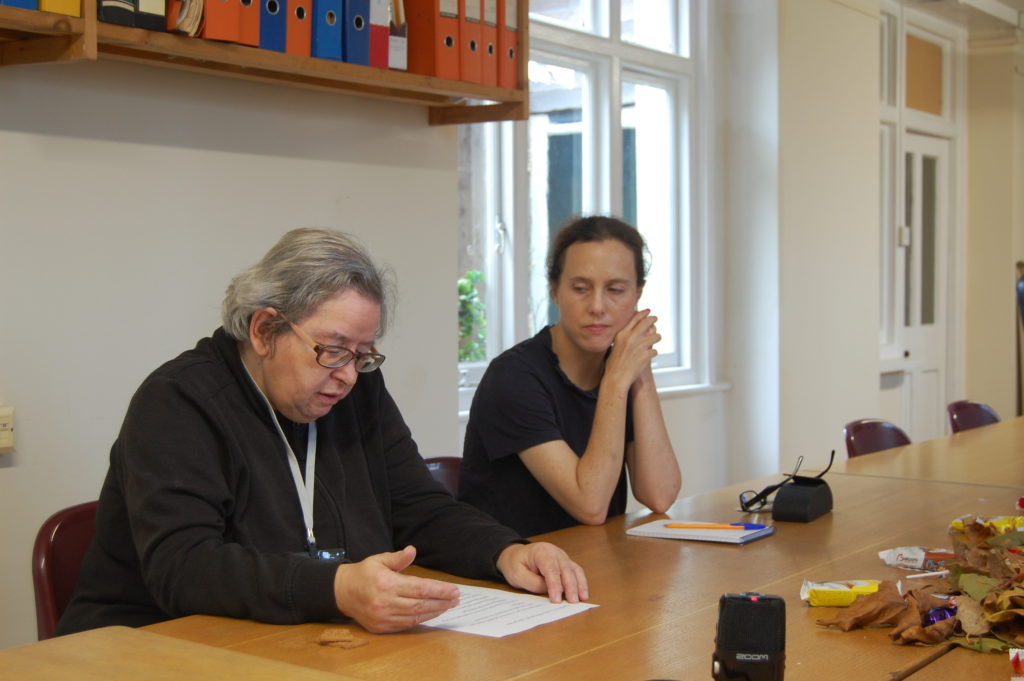
Reframing your own identity in a positive way
“When people recognise strengths in you, they almost have to push the best parts of yourself forward, and it harnesses it and magnifies it, and you start to build a stronger identity. If you’ve got a negative idea about yourself and a low self-worth but someone recognises your strengths, and you recognise it too, together you’re building this new identity, which is not really new; it was always there but it’s becoming more dominant. It gives you the confidence to take action and then from that action you have more confidence, and it builds on itself. Then you get good at recognising strengths in other people, and you could then do the same for them. You build a network of protection around yourself with your own internal understanding of who you are, and how other people are seeing you.
“You can start then reframing your more vulnerable ideas of yourself and vulnerable experiences as strengths.
“This is something that I lived through and now I’m through the other side. Now I have this knowledge I’m able to use that to help other people and to see it as strength: actually these things that caused me to be vulnerable now are my strengths; because I have this knowledge, I have this authority. You must have that authority when you’re talking to families and advocating for them. You need to feel safe enough to look back at the vulnerable parts of your life. If you aren’t feeling safe or confident enough you can’t look at that stuff because it will stop you from functioning.” – social worker
Balancing confidentiality and safeguarding concerns
When a social worker asked whether parent advocates respect the same level of confidentiality as social workers are required to, one parent responded:
“Being a parent advocate, I have a significantly higher level of confidentiality and data protection than any social worker I’ve met. For example, when I was accused of harming my daughter, my other daughter was invited to a sleepover. The social worker went to her friend’s house and told the mother, ‘If you let this child come to your home for a sleepover, you’re putting your children at risk, and I’ll be forced to investigate’, and then the social worker proceeded to give forth all this information about how I was accused of assaulting my child, which wasn’t accurate, that I had a criminal record—again, that wasn’t accurate—and gave all this misinformation to a complete stranger that didn’t have anything to do with the investigation. This was quite harmful to my 12-year-old who just wanted to go for a sleepover.
“That wasn’t lawful but there’s no recourse. I can think of any number of confidentiality and data breaches in my own case and other people’s cases. Unfortunately, social workers probably need more training on confidentiality. But as a parent, I would never do that to another parent. We’re incredibly protective of each other and probably go to further lengths to protect each other.” – parent
“Social worker confidentiality can be breached if there’s a safeguarding concern. But how does the individual social worker make that decision? They know they are about to breach confidentiality. The whole thing has become much more authoritarian than it used to be. There’s less discretion in the social work role now because legislation has shifted.
“Each time a new law is passed, it’s always moving towards a child protection lens and away from the more supportive roles.
“In the old days, there was more money in the informal community system so that family support could have been provided by a range of people who didn’t necessarily need to be social workers. Now you’ve got a much more mechanized surveillance-based system. You hardly ever get to see real breathing projects because you’re stuck in in front of the computer, inputting vast amounts of irrelevant data into broader draconian assessment tools.” – social worker
“One of the social workers that I work with has recently retired, partly because she’s says today it looks nothing like the profession she went into. She talks about when she was a young social worker, and they needed to make an application to remove a child. She says: ‘We had to go knocking at the judge’s door and he’d come out in his pyjamas, and often his wife would go get us a cup of tea and we’d sit at his table very uncomfortably while he cross-examined us about what has changed today that makes this order necessary and that’s different from yesterday.’ They don’t ever ask that any more.
“Now it’s a rubber-stamping exercise. I had two newborn removal hearings in the same week in front of the same judge. And at the second hearing, he had the audacity to say, ‘If they’re making this application, it’s such a rare application that it needs to be granted’. I said, ‘We were doing this 48 hours ago. Tell me how that’s rare?’ They don’t question things any more, so maybe one of the values of peer-to-peer support is we try to hold accountability. We ask the questions that used to be asked but aren’t being asked any more.” – parent
Protecting people
“I think the value of peer-to-peer support is protecting other parents. We have the same journey. We’re actually over-vigilant on not breaching confidentiality because we know exactly how it feels for that to be done. We are very lawful and that helps us to advocate for holding people accountable. If I work with a family and have information told to me that someone was at risk, I don’t take that decision lightly, but I would absolutely act on that. I want to protect the people that need to be protected.
“We don’t try and avoid intervention if it’s needed. If something disclosed to me needs to be shared externally, I’m very transparent and honest with families about that. I might not be a social worker, but the Children’s Act does state for us to do that as society members. I am very transparent and clear about that. But I don’t put risk and fear into that disclosure. It’s more of an open conversation. As peer to peer support, we have a great awareness as to when external interventions are needed as well.” – parent
A rights-based approach
“Yes, we’re not anti intervention. We’re very pro intervention. When I needed to bring an intervention, I was transparent with the mum. I went to her to say: ‘I need to seek help. If you won’t, then I have to, but I don’t want to do that without you. Come with me. Let’s do this together. Let’s empower you to seek that help’.
“I’d rather help her to make that disclosure, because that also helps build you back up. It’s the first step in the right direction.
“Whereas I don’t feel like social workers do this. You tend to find out their actions five minutes before the meeting in a report where they’re looking for the worst possible explanation. One of the first things I do with a parent is look at their human rights and rally a team, build them a community, and make sure they have all the support they need for the long haul to battle. That’s all intervention, isn’t it?” – parent
“That’s a human rights-based approach. We do actually have in place domestic legislation but I think peer-to-peer support and advocacy allow parents to come together to adopt international standards that go beyond what domestic law and practice generally is. That’s the real strength of it.” – academic
The value of peer-to-peer support
Peer support includes practical issues like digging up information. More broadly, it offers people undergoing great trauma and pressure a space to express their emotions and to compartmentalise. Parent advocates talk about how they share their wisdom about the challenges of oppressive systems, and also how they try to absorb outrage to shield other parents as best they can.
“Law firms who refer parents to me call peer-to-peer support ‘client management’.
“Some of the value they see in it is that when somebody is going through a crisis, they may end up making poor decisions because they’re under such enormous pressure. If then we add peer support, they would be able to walk that very fine line they need to in order to get through a court case.
“And another value of peer support is that I regularly and routinely call the child law centre solicitors and barristers. I call up judges. There’s nobody I won’t call to ask a question because if I don’t have the information I go out there to try to find somebody who has it. I don’t see social workers doing that. They tend to sort of make it up as they go along, often with bad consequences. I suspect if they felt empowered to do so, maybe they would find they could have better practice too. But we parents go out of our way to try to find the right answer. I never want to lead anyone wrong.” – parent
“With peer-to-peer support, there’s the value of head space to help somebody compartmentalise when they’re under immense stress.
“Doctors advise you not come alone if you’re about to receive results, because in a moment of trauma or crisis you just can’t process what is being said to you. It’s the same for parents, families, and carers.
“When they’re under immense stress or getting severely bad news, the really good value of peer-to-peer support is to help them compartmentalise information.” – parent
Shared wisdom about challenges
“Peer-to-peer support is about education–not from books or school, but education on how life is. To see the world for what it is and have to accept that and live within it is a difficult pill to swallow. It’s educating each other on how the world actually is and not through a perceived lens. A lot of people will never be able to stomach that systems are built to abuse and oppress us. Some people just won’t ever be able to process that information. But we have to talk about that stuff too.
“Educating people on how to operate in systems that are intended to abuse us is a massive value that comes from peer-to-peer support that you’ll never get from any other system.” – parent
“It’s the shared wisdom of confident, robust peer support with no illusions about what the world looks like, and with the psychological ability to actually be upfront with people about the challenges.” – social worker
Absorbing outrage for other parents
“We also can identify how much of that to give or not. I’m not gonna go and tell parents that this system traffics our children when they’re trying to fight to get their kids back because that’s not empowering information. First I’m going to empower them all the way to get their kids back. It’s about that consciousness of how much to give, what not to give. You empower them on an individual basis by knowing where someone is wanting to go and helping them to get there but not pushing them any further. A social worker would just come and dump the suitcase at you and say good luck. Whereas we say, where do you want to go? Let’s help you get there.
“I always hit moments of depression or just pure rage because it’s excruciating sometimes. I’m absolutely furious, and completely understanding Guy Fawkes. But in peer-to-peer support, we sort of absorb that outrage for other parents to just allow them to continue.” – parent
“We have to absorb the outrage. It’s what sometimes makes or breaks cases where social workers say, ‘This parents is not engaging. This parent is too hard to work with. This parent has a personality disorder’. I know this parent is traumatized and angry. And given the situation, that’s totally reasonable! But right now the social worker is going to have to deal with me because they’ve traumatized them to the point where they’ve broken down the relationship. We’re the ones that start to build that bridge again, partly by, as you say, absorbing a lot of that for them.” – parent
Space to express emotions
“Giving somebody peer-to-peer support is giving them the space to have emotions because social workers expect you to be a robot. If you cry, you’re ‘emotionally unavailable for your child’. Who even made that shit up? Are you now teaching children that it’s not okay to show their emotions or cry?
“Peer support gives that space for people to be able to feel and process emotions. We advocate that it’s okay for somebody to be feeling that at that moment, and we don’t need to penalize them for shedding a tear.
“In fact, I’d be very concerned if a parent or carer sat at a conference and didn’t feel any emotion. I would actually think they are psychotic for being unresponsive and completely detached. Having a bit of anger or emotion shows your passion and character. As peers, we can stop the cycle of judgment in the moment.” – parent
Not second-guessing other parents
“It’s accountability again. We flag up those misguided interpretations of things, like the idea that crying makes you emotionally unavailable. I was told I wasn’t allowed to tell my daughter, ‘I love you’ when she left contact. So instead I told her, ‘Thank you. I really enjoyed playing with you’–but that was put in a report to show they were concerned that I didn’t have any attachment to my daughter because who says ‘thank you’? But I just I didn’t know how to tell her how much the visit meant to me. We can go into conferences and pick that out to say: ‘This is not a reasonable humane judgement’.” – parent
“The really powerful value of support advocacy with parents is never second-guessing what another parent is trying to achieve.” – parent
“In this discussion, I’m feeling a sense of community and I feel motivated to keep trying. I sometimes feel like I’m haphazardly taking swings just trying to make it better for people. But it takes a community to do it together.” – parent
“Having values of peer-to-peer support that are written down gives motivation and inspiration for change. It helps us to understand our identity and feel a part of community. To be rooted in our values aligns us with where we’re going, and therefore sustainable change is created.” – parent

